Eastern Promises
 for strong brutal and bloody violence, some graphic sexuality, language and nudity.
for strong brutal and bloody violence, some graphic sexuality, language and nudity.
Reviewed by: Steven Warburton
CONTRIBUTOR
| Moral Rating: | Very Offensive |
| Moviemaking Quality: |
|
| Primary Audience: | Adults |
| Genre: | Crime, Mystery Thriller |
| Length: | 1 hr. 40 min. |
| Year of Release: | 2007 |
| USA Release: |
September 14, 2007 (wide) |
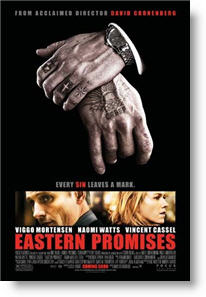
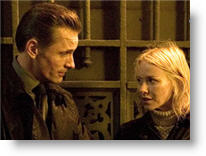

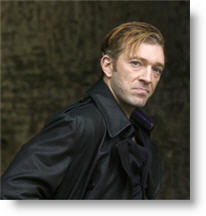


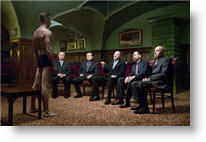
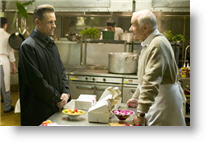
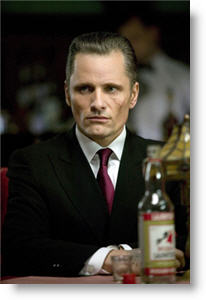
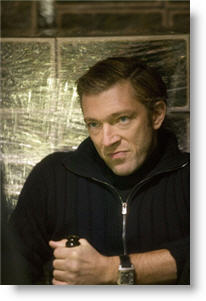
| Featuring |
|---|
| Viggo Mortensen, Naomi Watts, Vincent Cassel, Armin Mueller-Stahl, Sinead Cusack |
| Director |
| David Cronenberg (“A History of Violence”—2005) |
| Producer |
| Stephen Garrett, Paul Webster, Robert Lantos |
| Distributor |
“Every sin leaves a mark.”
Movies like “Eastern Promises” occupy something of a moral quagmire. We live on planet Earth, a world which—according to St. Augustine—is populated by sinners and saints. Human nature is evil. You don’t even need the Bible to tell you that. All you need is the morning papers.
The characters in “Eastern Promises” are also evil, and the movie doesn’t flinch in depicting the extent of how fallen people are.
The plot: A 14-year-old girl bleeds to death while giving birth. A nurse takes the girl’s diary, which leads her to get involved with a Russian mafia family.
We meet three members of this group of mafiosos, a ruthless father, his equally brutal son, and their “driver” (who may not be what he appears.) At first, the father is very kind to the nurse, but he slowly become more malevolent when he realizes that the diary implicates him.
There are two shockingly violent scenes in the movie—one where a man gets his throat slit in a barber’s chair and the other when Viggo Mortensen engages in a brutal knife fight with two gangsters in a Russian bath house. Viggo does the scene totally naked, by the way, and there are brief flashes of full frontal nudity.
There’s another scene where Viggo’s character is more or less forced into having sex with a prostitute. This scene is not very erotic. Both characters are obviously comfortable with the act, making it feel more pathetic and sad than it does pornographic. There’s a scene later when Viggo gives the prostitute some money and a religious tract. Touching as it may be, I wouldn’t recommend this as a witnessing technique.
A note on the profanity: Sometimes it’s over the top, but there are no instances of Jesus’s name being taken in vain, and, if I recall correctly, no mentions of God in a disrespectful tone either. There are a few f-words, but I’d rather hear the F-word 5,000 times in a row than hear the name of Christ taken in vain once. By the way, the film’s writer, Steve Knight, also wrote the recent movie “Amazing Grace.”
Watching “Eastern Promises,” I was reminded of “Goodfellas.” Here are two movies about life in the mob and the luxuries that a life of crime can provide. But far from being advocates of these lifestyles, the films show that the good times do not last long, that you can get taken out at any second for virtually any reason at all.
“Eastern Promises” shows human nature as it really is.
See list of Relevant Issues—questions-and-answers.


In both movies sexual perversity is a metaphor for personal and professional corruption. In “A History of Violence” the homosexuality had a comic tone: the foppish gangster brother played by William Hurt surrounded by blonde well-coiffed capos was a new and ironic take on what had become stale in movies. Here in “Eastern Promises” the young gangster’s homosexuality (the need to watch his driver engaging in a sex act—the cheek to cheek reconciliations) lacks the humor of the earlier film and is merely sinister—it harkens back to some of the old Bertolucci movies (“The Conformist” or “1900”) in which sexual perversity was equated with personal and especially political corruption. It was stale then and it’s stale now.
The best acting in the movie is by Armin Mueller-Stahl, as the Russian Syndicate’s chief operating officer, a man who is as much at home garnishing a cake with rose petals as he is signing a death warrant for a foe or for a daughter. He is scary but totally captivating. He reminded me of Herbert Marshall in “Foreign Correspondent” or Orson Welles in “The Third Man” or Joseph Cotton in “Shadow of A Doubt”—the best villains are always the nicest ones; the ones that are easy to get close to. The Prince of Darkness would not be so appealing if he weren’t such a gentleman.
Very Offensive / 3½
Very Offensive / 5
This is an excellent movie for ADULT AUDIENCES who can properly analyze a film and tell what goes against the Bible and what doesn’t. Much to many parents' relief, this isn’t exactly the kind of movie most kids would find interesting anyway; there’s no action sequences (though there is some strong violence), no pounding rock music (instead we get a wonderfully lush score from LOTR’s Howard Shore), and lots of seriousness and drama (quite a welcome relief after experiencing a long line of mindless blockbusters in theaters).
Nikolai, the main character (played by Viggo Mortensen, also from LOTR), is an honorable man. Of course, he makes mistakes like any normal human being (such as the scene where he has decidedly dubious-consent-sex with a young prostitute), but he rights his wrongs. He doesn’t kill someone when he was ordered to; in fact, he only kills out of self-defense, which isn’t prohibited in the Bible. He also gives the aforesaid prostitute enough money to run away and start a better life.
Anna (Naomi Watts), the other main character, is even more honorable. There is mention of previous cohabitation with a past boyfriend and a baby that was miscarried, but it isn’t depicted in the film.
Kirill (Vincent Cassell) is an off-the-handle sort of person who disrespects women (he was the one who ordered Nikolai to have sex with the prostitute), drinks a LOT, and seems to have homosexual feelings for Nikolai (feelings which aren’t returned). He is a rank, base sort of man, but I felt some pity for him—not enough to excuse what he did, but enough that I didn’t hate him.
[***SPOILERS END***]
Just as a note, the characters are a lot more honorable than those found in our favorite classics, such as “Gone With the Wind” or “Raging Bull.” The actions in the aforesaid movies should offend you more than the ones in these movies, regardless the rating. Look elsewhere on this page for the plot and premise of this film. I’m bad at rehashing plots. Things to watch out for:
*Strong violence. Not at all frequent, but when it comes, it is STRONG.
*Graphic sexuality. Most disturbing is the references to rape.
*Nudity (both sexual and nonsexual). There’s full sexual female nudity in the whorehouse scene, then full nonsexual male nudity in the bathhouse scene (though this male nudity shouldn’t be nearly as big a deal as the other nudity; if it is, reconsider your priorities)
*Language. Not too strong. The F-word appears more times than the Lord’s name in vain, which is a relief, as I find the Lord’s name in vain many more times offensive than the F-word.
That’s pretty much all. Many of you adults can enjoy this film so long as you can properly apply Scripture to it and find the good messages (the messages are predominantly good, by the way). But keep your children away.
Offensive / 5
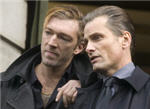

If you focus on the plot and character development alone, the film has its moments in providing a suspenseful storyline. The actors are very convincing. Good does overcome evil, so to speak in this movie, but not without having to become “one” with evil and beat them at their own game. This is not a film for young or impressionable new Christians.
My Ratings: Very Offensive / 3